#vulgate
Explore tagged Tumblr posts
Text
Babe wake up new Vulgate chapter just dropped


#arthuriana#arthurian legend#arthurian mythology#arthurian literature#vulgate#king arthur#merlin#news#my post
960 notes
·
View notes
Text
No, Sir Galahad is not in the Bible, and I never said he was.
OK, so in my series of posts and lectures about my work on Neil Gaiman's Chivalry, I pointed out that Sir Galahad's first appearance in Arthurian fiction was in the Vulgate, and that his name was originally spelled Galaad. Therefore the spelling in Neil Gaiman's Chivalry is correct, and Galahad is a later variant spelling.
Someone recently took me to task for saying this meant that I claimed Sir Galahad was in the Bible, and yet Sir Galahad appears nowhere in the Bible.
I never said Sir Galahad was in the Bible.
I said he was in the Vulgate.
Vulgate means "common version" in Latin.
The confusion here stems from the word "vulgate" which often refers to the 4th century Latin translation of the Bible commonly known as the Vulgate Bible.
But "vulgate" is also a term used to refer to The Lancelot-Grail Cycle, a 13th century French Arthurian cycle which is also known as the Vulgate or Vulgate Cycle -i.e. common version. Later translations of this work are known as Post-Vulgate.
Specifically, Galahad or Galaad appears in the Vulgate Queste del Saint Graal.
Happy to help.
Chivalry is available wherever fine books are sold, and you can come see me at the San Diego Comic Con Museum on October 4 where I will be signing and lecturing and showing art. Thanks.
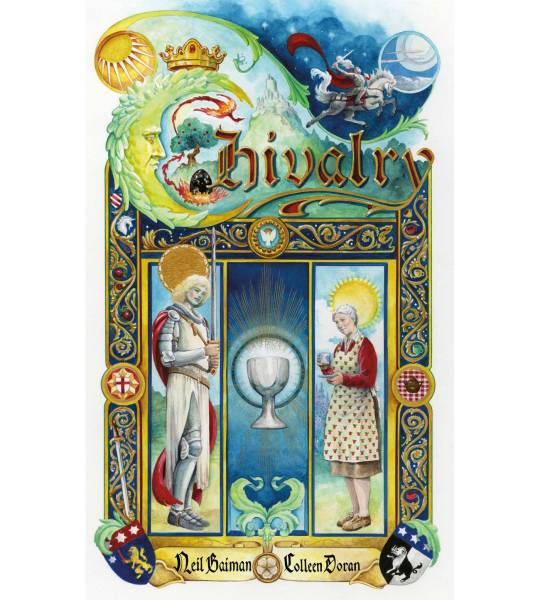
2K notes
·
View notes
Text
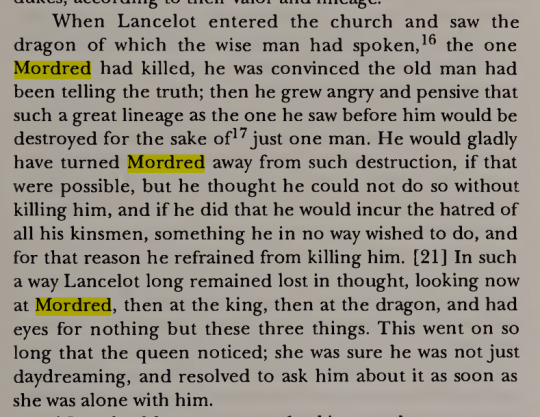
vulgate: lancelot part VI
losing my mind rn chat. how do we feel about this
he would have gladly turned mordred away from such destruction if that were possible
so so so much to talk abt this. first of all this is right after lancelot goes on adventuring with mordred. it's genuinely one of my favorite arcs in vulgate i think mordred and lancelot is an underrated dynamic, lancelot looks after him imo in a similar way that he does in gareth in later literature. there's also a cute tidbit where he praises him and mordred doesn't respond (which you could interpert however, but i think mordred was just being shy)

a key component here that mordred was just a young and newly knighted. i'd put him at like, probably in his early 20's. lancelot takes on the role of a well respected mentor figure and tries to guide him, he wants to guide him. that's the tragedy!
#cain.txt#arthuriana#arthurian literature#i love this so omuch#i also want to point out how guinevere IMMEDIATELY knows that something is wrong and lancelot goes to confide in her#there's a lot that happens i cbf to talk about it but they have a heart to heart#it's just so sweet. i love vulgate so much. it's insane how incredibly fleshed out adn characterized they are#mordred#lancelot#vulgate#medieval literature#arthurian medieval literature
98 notes
·
View notes
Text
56% of the knights who left for the grail quest were killed by gawain alone. fucking hell gawain
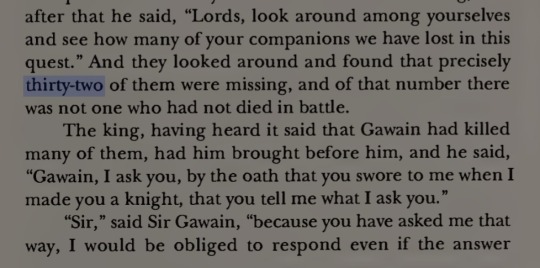
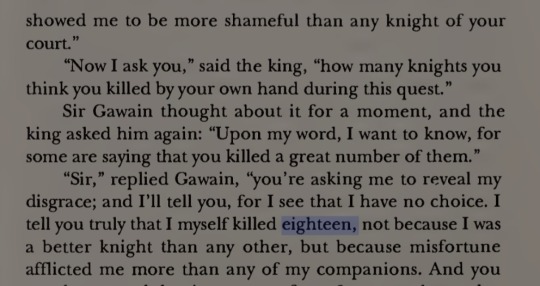
#SORRY I'm still thinking about this scene it's so funny#arthur: and how many knights have you killed gawain?#gawain: ...#arthur: I'm waiting 🤨#gawain: uhm 18 I reckon. aye. very unfortunate#vulgate#sir gawain
96 notes
·
View notes
Text

“Infelix ego homo! Quis me liberabit de corpore mortis huius? Ad Rom. 7”
“O wretched man that I am! who shall deliver me from the body of this death?” (KJV)
ταλαίπωρος ἐγὼ ἄνθρωπος· τίς με ῥύσεται ἐκ τοῦ σώματος τοῦ θανάτου τούτου
Quoting Epistle to the Romans 7:24, this graphic comes from Pia desideria : emblematis, elegiis & affectibus SS. Patrum illustrata, a collection by a Brussels Jesuit, Herman Hugo, called “the most popular spiritual love emblem book, which made the genre popular throughout Europe in the 17th century and beyond. By the end of the 18th century the Pia Desideria had been reprinted nearly 40 times in Latin, French, German, Spanish, Dutch, Polish, English, Danish, and Italian. This emblem book mixes tender messages of care with dire warnings to sinners, and while it is written in Latin, demanding a well-educated reader, it proved to be wildly popular. (biblio.com)”
The graphics in the book are by Boetius Adamsz. van Bolswert, a Frieslander.
#emblem book#herman hugo#dutch artists#religious imagery#memento mori#epistle to the romans#pauline epistles#vulgate#1624#1600s#17th century
67 notes
·
View notes
Text

vulgate monks really said lancelot had “no thoughts, head empty” and then put him into a violent rampage
42 notes
·
View notes
Text

I too, would be wondrous if I only knew how to keep my mouth closed or thought before I spoke, perhaps that’s why Kay will always be my favorite knight.
More slander of Kay’s wet nurse! How much can we blame on the peasant tiddy before we have to admit that maybe he’s just an asshole.
#I really love the clarification that he’s not evil he just doesn’t think before he speaks#he’s just out of pocket#we all have a friend like that#arthurian literature#arthurian legend#sir Kay#sir kay apologist#the story of merlin#vulgate#post vulgate#lancelot grail
8 notes
·
View notes
Text
Queer reading of Vulgate pt 3, intro pt 2
preface | intro pt 1 | intro pt 2
Still on E. Jane Burns' Introduction to the Vulgate Cycle. It continues exploring the same basic thesis: the indefinable nature of the Vulgate, and the author(s) of and influences on the text.
"If the Vulgate’s textual genealogies demonstrate an obsession with origins that parallels that shared by Chapelain and Lot, they reveal simultaneously how, in the case of these narratives, the preoccupation with origins leads consistently to no verifiable authorial source. We are left rather with a plurality of authorial voices and competing subtexts that cannot be aligned in logical sequence. Credit for narrative invention falls on a cohort of fictive authors that range from the chivalric heroes who speak their adventures at King Arthur’s court to the Active dictator Merlin and his vernacular scriptor Blaise, to the bogus author/translator Walter Map, the storyteller Robert de Boron, and the oracular voice of Christ. Amid all these references to creators and their sources, both written and oral, no mention is made, curiously, of the actual textual antecedents for the Vulgate Cycle. Yet there are many."
Burns goes in depth on the textual antecedents, but it doesn't provide anything new to talk about for the purposes of these reading reaction posts, so I'll gloss over those.
"The truth told here is obviously of a different sort. It is a truth not of events or revelations, but a truth anchored solidly in the pleasurable, rhetorical use of words. Herein lies the answer to critical objections raised by Chapelain and Lot. For the insistent repetition of too many words that put Chapelain to sleep and offended the aesthetic sensibilities of Ferdinand Lot lies at the very heart of the Vulgate’s project to validate the literary text over and above its more erudite predecessors. Repetition serves in many ways as the hallmark of the Vulgate romances: repetition of authorial voices, of stock motifs and thematic material, or of whole segments of narrative lifted from the Queste and relocated in the Estoire. And that repetition draws attention to the specifically literary character of the Vulgate romances, undermining their professed pretentions to more lofty theological or historical expression."
Apparently, repetition of this variety was a liturgical device, theological. So the Vulgate's use of repetition becomes a kind of "textual idolatry" (as far as St. Augustine would see it).
"Thirteenth-century clerical pronouncements deplore the falsehoods and lies written about Perceval and the Holy Grail, lamenting those who have abandoned religious truth in preference for stories about Lancelot and the secularized holy relic. If the Grail material is the most religious component of the Vulgate corpus, it appeared as most irreligious to medieval Church authorities."
So even the religious elements of the Vulgate Cycle were seen as distractions from true spiritual pursuits by the religious authorities of the times. Sacrilegious, even.
(In other words, don't confuse all the Christian symbolism for religiosity. That was just the symbolism of the era. Writers worked with what they had available to them.)
The Quest for the Holy Grail, of course, is the most religious. Some think it might have been written by Cistercians; others think it was by laypersons trying to make it palatable or acceptable to the Cistercian order. Burns argues that "Meaning in the Queste is not first hidden and then revealed, but rather it is systematically displaced from one textual segment to the next." Adventure stories are interspersed by a hermit telling a parallel Biblical tale that doesn't actually have a lot to do with the event they're supposedly interpreting. (This … makes the Quest make a lot more sense to me, actually. The parables always felt shoehorned in and interruptive rather than actually relevant.)
"In their narrative wandering, the thirteenth-century prose tales of love and adventure remind us that when analyzing them we need not look for a reassuring map to guide our literary voyage. And that in taking this trip we need not choose necessarily between unity and disunity, coherence and incoherence, between the ingenious author’s masterpiece and the barbarian’s literary dungheap. These excessively polarized options are perforce limiting and exclusionary in their own way."
Is Burns arguing that we should read the Vulgate in a nonbinary way? Delightful. :D
"…that very distortion can lead us to ask more productive questions, in particular questions about those sectors of the literary terrain that the quest for authority and textual unity has so often marginalized or effaced."
Oh, don't worry, Burns, I have years of practice deciphering queercoding in media. I'm all about looking for the "marginalized sectors of the literary terrain".
And that's the introduction! Whew. Finally. Now to actually reading the Vulgate Cycle. Starting with my least favorite: The History of the Holy Grail.
#arthurian literature#vulgate#vulgate cycle#vulgate cycle introduction#E Jane Burns#qrv#queer reading of the vulgate#arthurian newbie#not really but that's the tag for my arthurian lit readthrough so I'm stuck with it
9 notes
·
View notes
Text
QRV - Story of Merlin 4.1
preface | intro pt 1 | intro pt 2 | HHG merlin pt 1 | merlin pt 2 | merlin pt 3.1 | merlin pt 3.2
Ulfin the pickup artist / dudebro podcaster over here 😒 advising King Uther Pendragon on his "love" (lust) for Duchess Ygraine (who is visibly distressed by Uther's advances, btw. Enough so that the rest of the court notices she's upset):

So Uther asks Ulfin what he should do, and Ulfin says, "You groom her husband Duke Gorlois of Tintagel and the rest of the court by showing Gorlois so much favor, being his best friend, gifts, spending tons of time with him. Meanwhile I'll court Ygraine on your behalf and send her lots of gifts and compliments."
Which Ygraine refuses, because she's aware that Uther's stalking her, and she's not into it.
When Ulfin finally admits he's doing this on behalf of the king, she crosses herself and says, "God! what a traitor the king is to make a show of loving my husband and me, yet he means to shame him! Ulfin,” she went on, “take care not to let it happen that you should ever say such words to me! For I want you to know that I would tell my husband, and if he knew it, you would have to die!"

Ulfin: ::slides into Ygraine's DMs on behalf of Uther:: hey my king thinks ur hot
Ygraine: wtf no, he's been acting like a friend to my husband and me just to try to get me to cheat on my husband? Don't say anything like this to me ever again. I'll tell my husband next time and he'll kill you.
Ulfin: gladly :D
Ulfin: oh c'mon, what about a pity date, he's dying bc he wants u so bad, ur such a (expletive)
Ulfin: haha funny joke
Ulfin: fr tho, date the king
Ulfin: or else
(later)
Uther: omg of course! She's just saying that for appearances, I just have to be ✨ persistent ✨ and then she'll be into me
...
...y'all, some things haven't changed in 800+ years.
(and at the same time, the narrative of the Vulgate is explicitly calling out this behavior as Not Okay. Uther and Ulfin are being drawn as In the Wrong here. by french medieval monks or whatever in the 1230's. soooo .... recognizing that this behavior is Not Okay is also not a new thing!)
#uther pendragon is the worst#ulfin is the worst#ygraine is awesome#gorlois is also pretty great#I don't know when or why gorlois started getting villified but I won't stand for it#and uther is irredeemable sorry not sorry#uther pendragon#ygraine#igraine#ulfin#vulgate#vulgate cycle#story of merlin#vulgate story of merlin#qrv#qrv som#arthuriana#read all the arthuriana#arthurian medlit quest#arthurian literature quest#medlit#arthurian literature#read all the arthurian literature
8 notes
·
View notes
Text
having a medlit blog on tumblr like
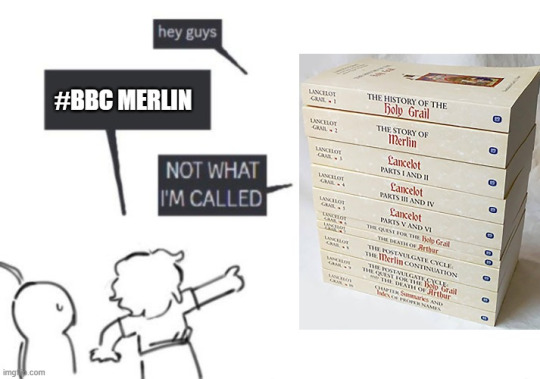
#arthuriana#arthurian legend#arthurian mythology#arthurian literature#vulgate#lancelot grail cycle#if you tag vulgate news or someones medlit art/fic as the show i do actually think youre being rude af#not everything has to be about you#memes#my post
386 notes
·
View notes
Text
Book of Kells

A 4K image of the Book of Kells. Over 185 calfskins were used for its creation.
If you tap and zoom, you can still see the striae — the natural lines and imperfections of the vellum.
—
The Book of Kells, sometimes known as the Book of Columba, is an illuminated religious manuscript and Celtic Gospel book in Latin, containing the four Gospels of the New Testament together with various prefatory texts and tables.
It was created in a Columban monastery in either Ireland or Scotland, and may have had contributions from various Columban institutions from each of these areas.
It is believed to have been created c. 800 AD.
The text of the Gospels is largely drawn from the Vulgate, although it also includes several passages drawn from the earlier versions of the Bible known as the Vetus Latina.
It is regarded as a masterwork of Western calligraphy and the pinnacle of Insular illumination.
The manuscript takes its name from the Abbey of Kells, County Meath, which was its home for centuries.
#book of kells#book#calfskin#striae#illuminated manuscript#book of columba#religious manuscript#Vulgate#Vetus Latina#calligraphy#illumination#Abbey of Kells#new testament#gospels
4 notes
·
View notes
Text

Vulgate: Lancelot VI / more at Arthurian Preservation Project
#mordred#sir mordred#sir lancelot#arthuriana#arthurian literature#arthurian mythology#arthurian legend#medieval literature#knights of the round table#vulgate#arthurian medieval literature
40 notes
·
View notes
Text
I was reading the episode of the knighting of Galahad in Keith Baines's rendition of Le Morte d'Arthur and a detail that caught my attention was that, when Lancelot asks if it is Galahad's desire to become a knight, it is the nuns that answer first, "and Galahad assented."
I found it so fascinating that I went to check the wording in Malory's original text – only to find that it's not what it actually says, since in the original version "he [Galahad] and they all [the nuns] said yea", which I think is quite different from Baines's rendition.
Anyway, since I was now curious, I went to check how the same episode is described in The Vulgate and the Post-Vulgate, and I discovered Galahad's involvement and degree of "enthusiastic consent" varies.
Here are the excerpts from the different texts:
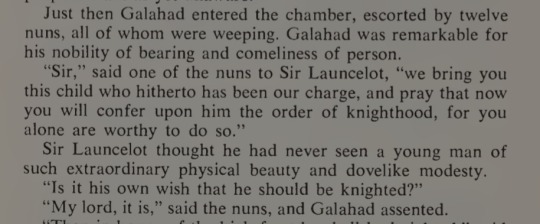
— Keith Baines's rendition of Le Morte d'Arthur
Sir Launcelot beheld the young squire and saw him seemly and demure as a dove, with all manner of good features, that he weened of his age never to have seen so fair a man of form. Then said Sir Launcelot: Cometh this desire of himself? He and all they said yea.
— Le Morte D'Arthur: Book 13, Chapter 1
In the Vulgate, Galahad is described as a child; it is the nuns that pray Lancelot to knight him, and Lancelot tells them that he will not deny "their request". Here Lancelot doesn't bother asking Galahad what he wants:
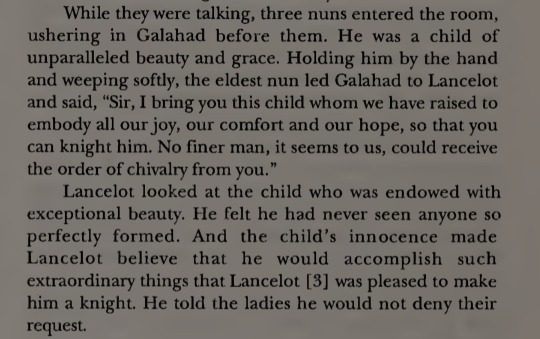
— The Vulgate, The Quest for the Holy Grail
In the Post-Vulgate, Lancelot asks Galahad if he truly wants to be a knight, and Galahad "answers enthusiastically":
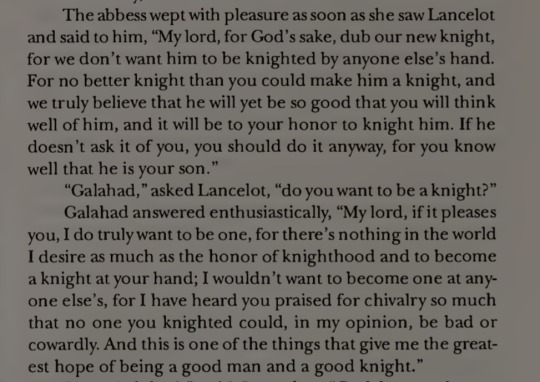
— The Post-Vulgate, Part II
It's a small detail but it has interesting implications about Galahad's agency in his own destiny.
#sorry this post doesn't have a point its more of a note to self#all scans courtesy of @queer-ragnelle#also! lancelot not knowing galahad is his son#vs the nuns telling him “you should knight him even if he doesn't ask it because he's your son” in the post-vulgate...#I think that adds something to lancelot asking galahad if he does want to be knighted#some paternal concern. one could argue. idk#vulgate#post vulgate#le morte d'arthur#sir galahad#arthuriana
12 notes
·
View notes
Text
MerGana and How Their Extremism May Follow Vulgate/Robert de Boron's Good vs. Evil Story
I think making bbcMorgana's first acts in S3 and S4 of saying that it was good that women and children of camelot will die was a fascinating and deliberate choice of making sure she was ireedemable and "evil" in the eyes of the audience.
The framing of bbcMorgana as killer of innocents (even when she was just following bbcMorgause's orders) in juxtaposition of bbcMerlin as vigilante executioner of treasonous criminals makes the audience lean more favorably towards bbcMerlin's extremism.
Writing bbcMorgana as one who takes pleasure in the suffering of others also enabled the producers to makes sure that the audience can forgive bbcMerlin's own crimes because he does it with obvious anguish.
............
Points to consider though:
BbcMorgana was educated for one year that what she was doing was right and justified. Based on her intimate knowledge if the peopleof Camelot, they are all complicit in the deaths of millions of the magic race and their allies. Her extremist training under bbcMorgause amplified that drive to punish all and then rejoice in their downfall. The bbcMorgana who cared for the wellbeing of Camelot already died when she was executed without trial and due cause (basically assassinated) for the sake of the Kingdom. (Remember, hemlock has no antidote)
BbcMerlin's extremism allowed him to bypass laws that even Camelot held dear. But since he does this with anguish, sorrow and burden of destiny/god's will then, he is forgiven and justified by the watchers of his acts even though he usually held the metaphorical gun at point blank range and then called it "self-defense"
............
I would say the merlinbbc show matches with the way The Story of Merlin was written in Robert de Boron tradition and the Vulgate. The clear distinction between good and evil in these classic literature was always "light and dark", "hatred and love."
Commiting heinous acts in "wrath, bitterness and revenge" "and taking pleasure in suffering" was the "work of the devil" "letting the devil into one's heart" (as the case of vulgate!merlin's conception)
And committing heinous acts while in anguish is technically acceptable in the eyes of destiny and the christian god. (As was the case of robertdeboron!merlin assisting in arthur's and ector de maris's conception)
...........
Then there is an argument that the show followed the heavily christian vulgate philosophy of good and evil all along?
That other philosophies and ideas which revolve around good/evil, light/dark, hatred/love being in constant balance should not be applied to the show because classic arthuriana doesnt use them?
..................
Redemption, also leans on the idea of bbcMerlin spreading the "good word" to the others. That the unbelievers will be saved if they join him in backing the One and Only Savior and King. If they don't and if they fight against it then there will be a judgement. It is never the other way around despite the unbelievers also having valid justification. As expected this reflects the highly christian messaging of the classic source material too.
Then if other watchers lean/sympathise more towards the motivations and actions of the "antagonists," "the unbelievers," "members of the old religion that fight against the prophecy" then they are "letting evil prevail" and "you dont understand the objective of the story"
Would it also mean that such antagonist-sympathetic fandom wank are technically not worth rehashing because it would be too rooted in actual historicity/real life instead of the classic arthurian mythology and christian influences that the show was based on?
.............
Anyhow the next time you hear people saying that the merlin bbc writers were stupid and didnt know what they were doing, please reconsider.
#otp: hatred to your love#otp: darkness to your light#vulgate#prose merlin#on how merlin bbc follows classical arthuriana: good vs evil#thots#heli blobbing#merlin meta#natural dyad#its an extremist vs extremist game#ultimately this was written as a mergana dynamic thing#theyre both terrible your honor
8 notes
·
View notes
Text
I’m gonna learn Latin to read the vulgate I need to know what all the fuss is about
8 notes
·
View notes
Text

Maybe something’s wrong with me but this is so funny. Arthur’s unhorsed, these grown ass men have him on the ground and are trying their best to beat this child to death (to be fair, he’s chopping people in half at this point, maybe not so baby anymore).
Then Big Bro Kay™️ flies in absolutely rocking King after King until he literally knocks the sense out of Lot. All I can think of are the family dinners later.
And of course we can’t forget the townspeople. Sending them in their way, whether they wanted to go or not.
#the amount of words dedicated to describing Kay beating the shit out of Lot has me rolling#arthurian literature#arthurian legend#king lot of Orkney#sir Kay#King Arthur#is he even a knight at this point#the story of merlin#vulgate#post vulgate#lancelot grail#knights knights knights!#fights!#I think the fact that we don’t knock each other off bourses anymore is what’s wrong with society#screaming#as always#sir kay apologist
4 notes
·
View notes